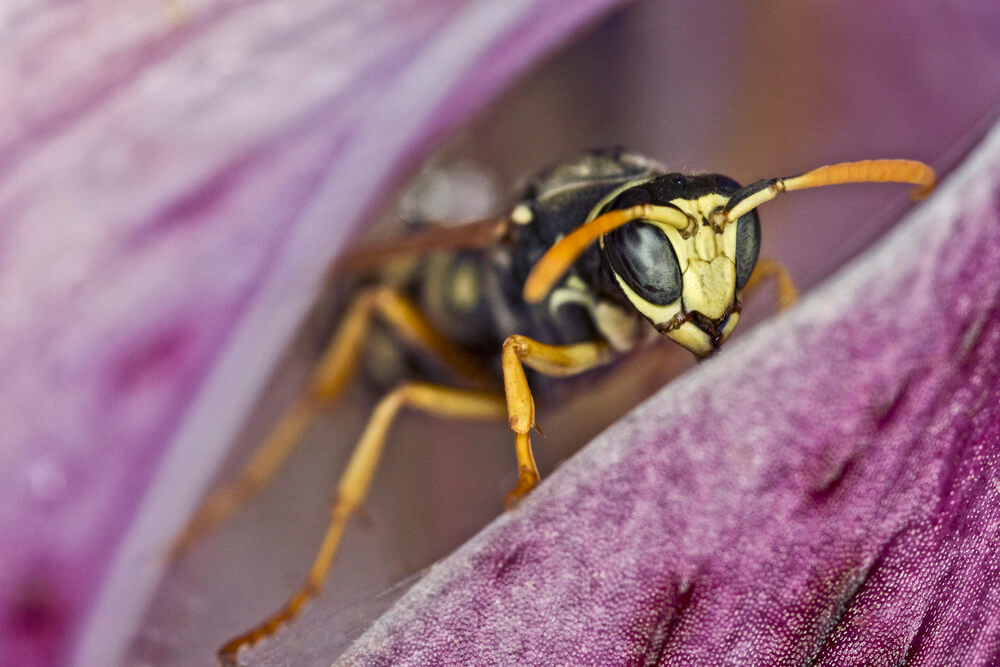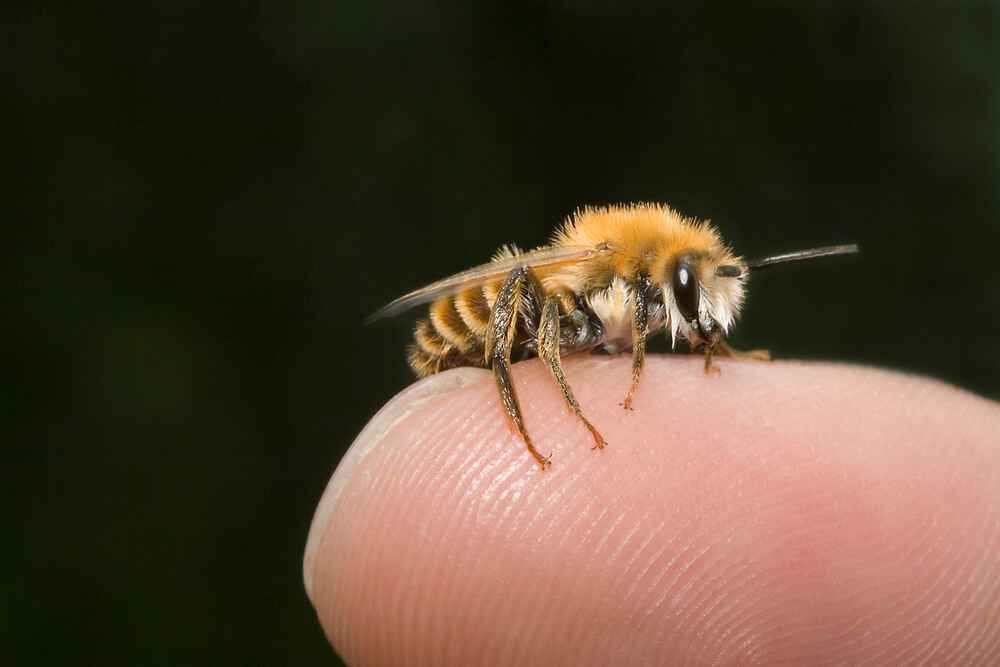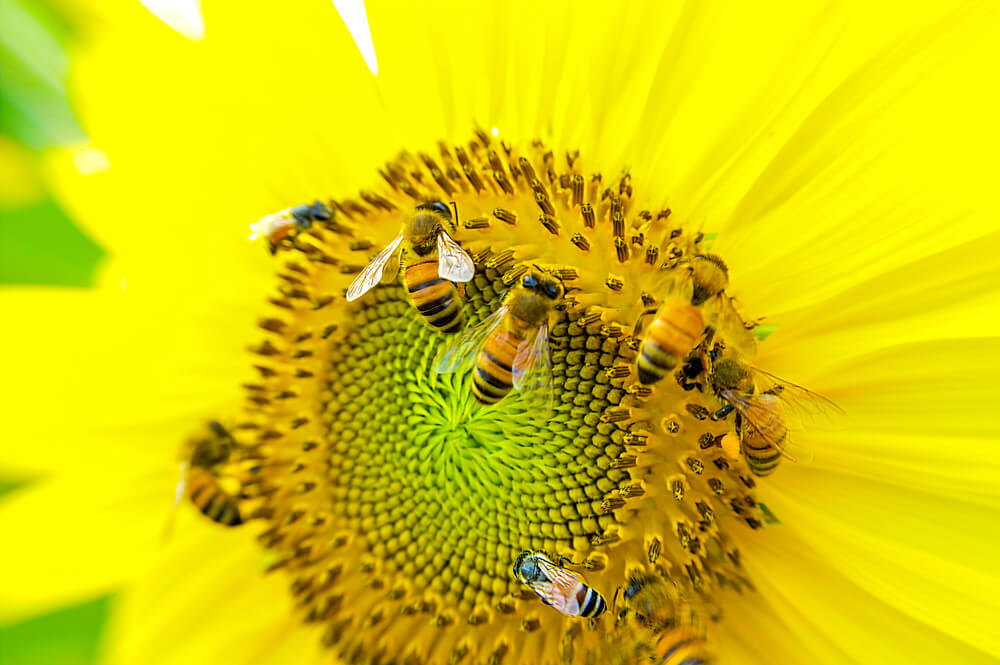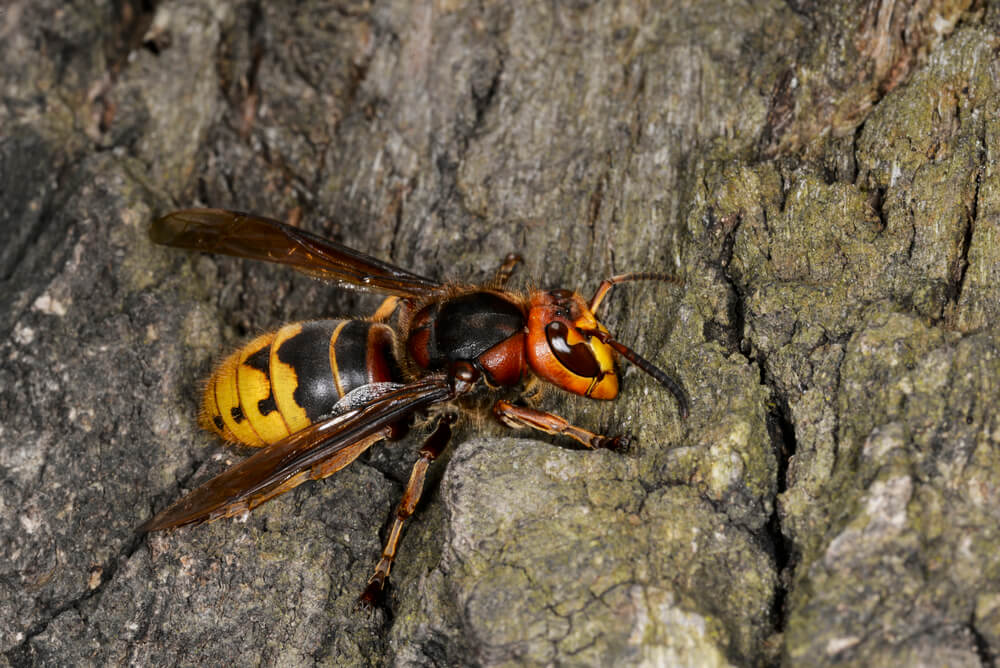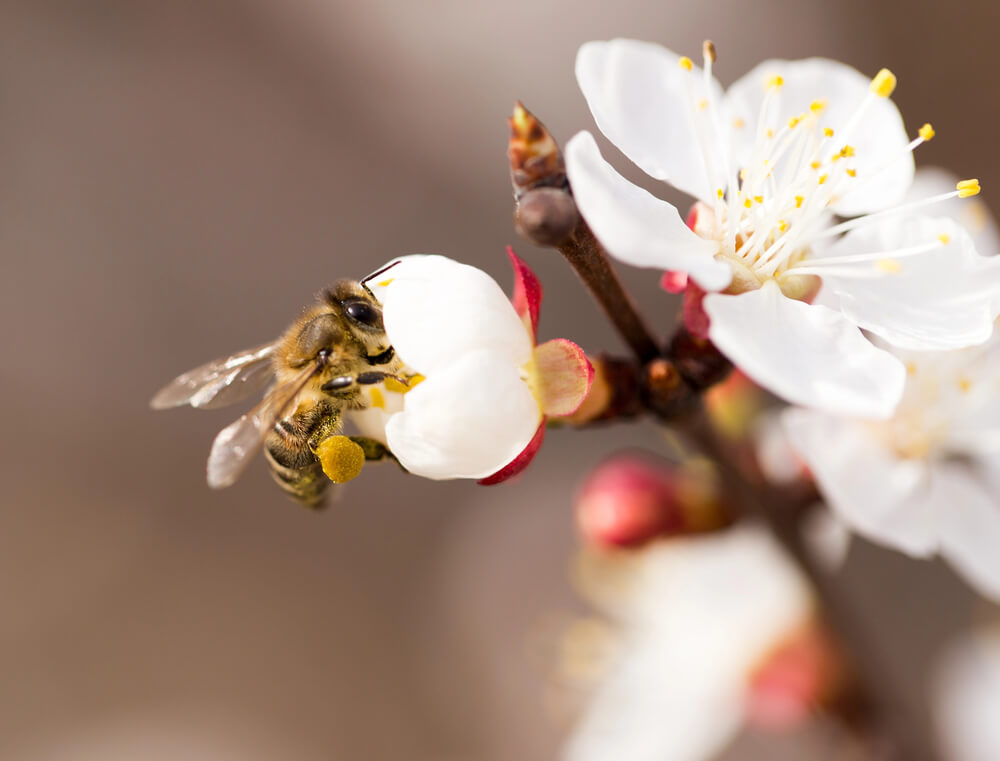Table of Contents:
What Does a Wasp Eat?
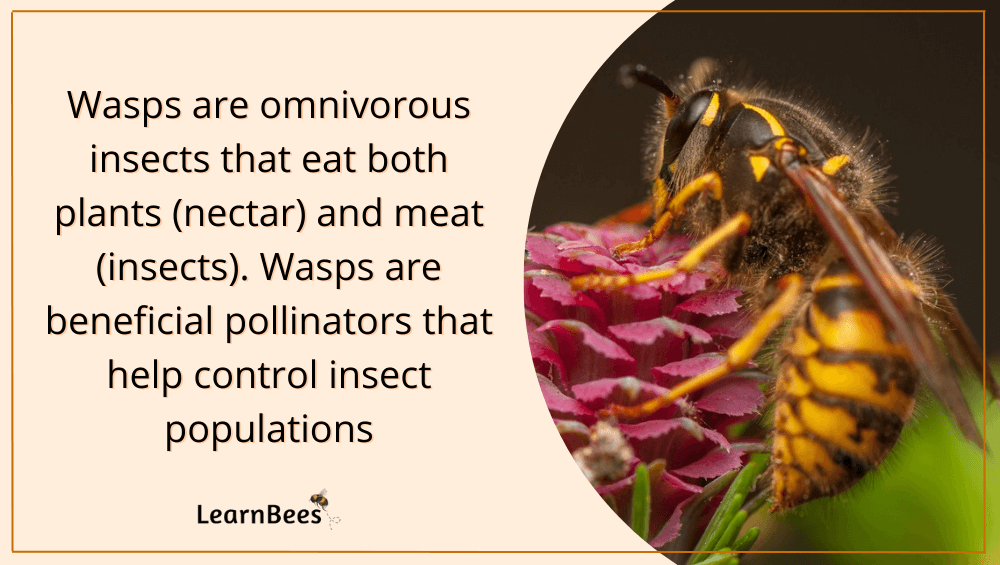
Wasps are omnivorous insects that eat both plants and meat.
Wasps are beneficial pollinators that help control insect populations like aphids, beetles, spiders, and caterpillars. As a result, farmers are increasingly turning to wasps for pest control instead of pesticides.(1, 2, 3)
Certain wasp species, such as parasitoid wasps (Meteorus autographae), are even used to reduce invasive insects like emerald ash borers.(4, 5)
Emerald ash borers are non-native bugs that have killed over 40 million ash trees in the United States alone. They are also estimated to have killed tens of millions of ash trees in Canada.(6)
Ash trees are among the most valuable and abundant North American woodland trees.(7)
Without wasps, our ecosystems would become overrun with pests.
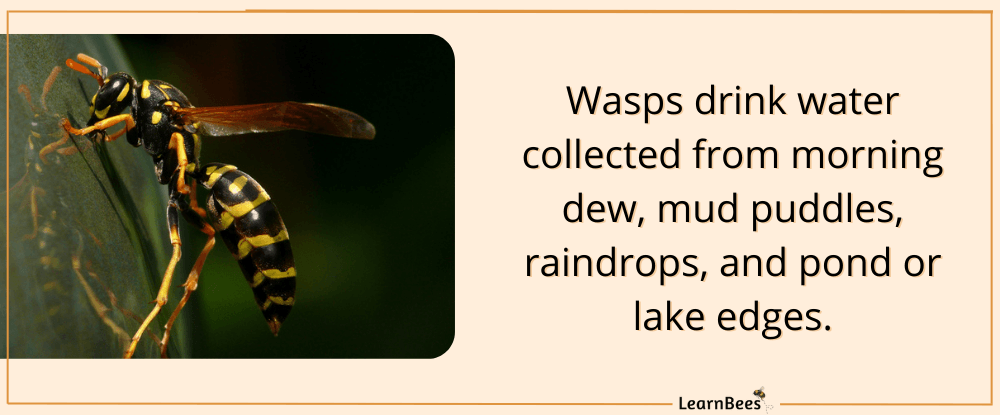
But as mentioned, wasps also collect nectar from flowers. Nectar is the sweet liquid plants produce to entice pollinating insects to their blooms.
However, nectar is more than just a sweet treat for wasps. It’s their primary source of carbohydrates, providing them with the energy they need to fly and survive.
The ‘meat’ is a crucial protein source that adult wasps diligently collect and feed their young. Young wasps need meat to grow and develop from the larva stage to the adult stage.
That said, adult wasps don’t eat meat like baby wasps. Instead, adult wasps feed primarily on nectar from flowers, fruit, or honeydew. It’s also common to see adult wasps collecting sugar water from hummingbird feeders.
Lastly, wasps drink water collected from dew, puddles, and pond edges.
How Long Can Wasps Live Without Food?
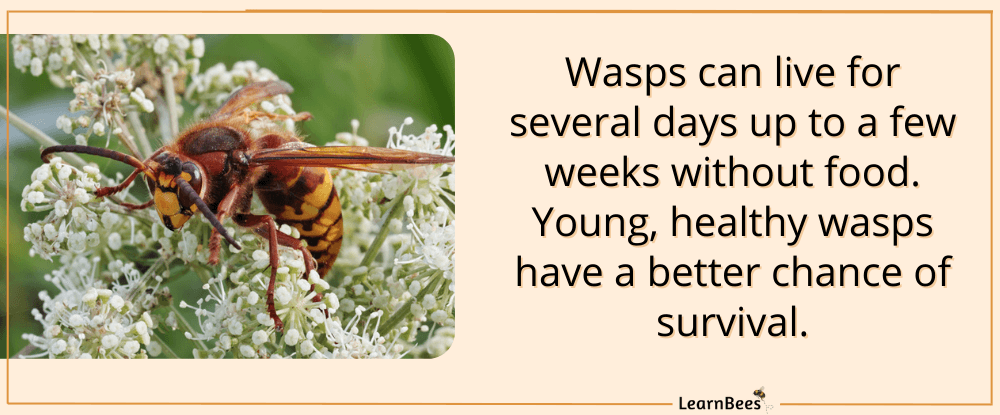
Wasps can live for several days up to a few weeks without food.
If a wasp gets trapped inside your home or car, it will look for sugary sweet substances to eat, including juices, fruit, and even candy. After a prolonged period without food, a wasp becomes lethargic and eventually dies.
The length of time a wasp survives without food depends on the species and age of the wasp. Young, healthy wasps have a better chance of survival.
Are Wasps Attracted to Human Food?
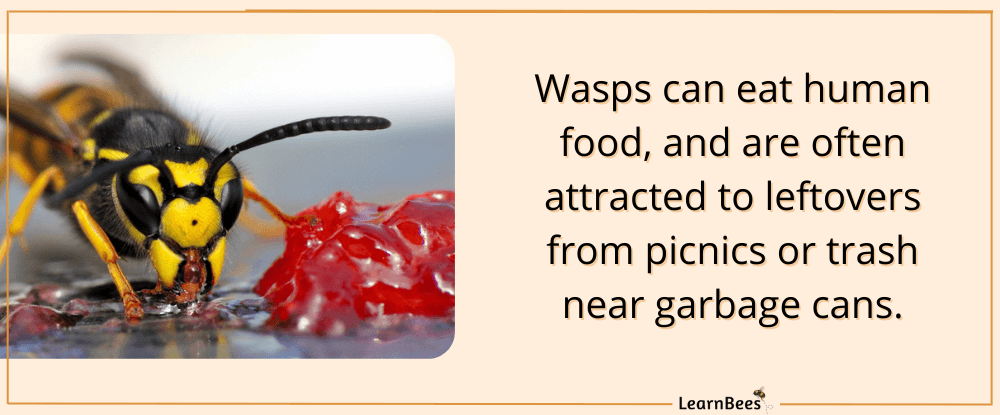
Wasps are attracted to human food, such as leftovers from picnics or trash near garbage cans.
However, wasps primarily feast on other insects for their protein source. They usually only turn to human food as an easy option when it presents itself.
To deter wasps, ensure your outdoor trash can is closed and that no food droppings are around. Spraying peppermint or tea tree oil around the area also works well since wasps dislike the scent.
FAQs on “What Does a Wasp Eat?”
- What are wasps’ favorite foods?
- Are wasps carnivores?
- How do wasps hunt for food?
- Do wasps eat spiders?
- Do wasps eat wood?
- What animals eat wasps?
- Do wasps eat bees?
- Do wasps eat meat?
- What do wasps drink?
- Do wasps eat mosquitos?
- Do wasps drink alcohol?
What are wasps’ favorite foods?
Wasps depend on nectar and meat for their survival.
Native wasps, like yellowjackets and paper wasps, prefer native flowers over non-native flowers. Native pollinators have evolved to develop a special relationship with native plants.
For example, some native wasp species have evolved longer tongues to collect nectar from certain native flowers. Without native plants, many native pollinators and bird populations would drastically decline.
Non-native wasps, such as European hornets (Vespa crabro), are generalist pollinators that can feed on various plants.
Plants create nectar to attract pollinators like wasps, bees, and butterflies. Such pollinators help move pollen from flower to flower. This process, known as pollination, allows plants to reproduce.
Since plants are stuck in one place, many rely on pollinators and wind for reproduction. Nectar is a sweet juice produced in glands called nectaries, usually located at the base of flower stamens.
—> Go back to the FAQs on “What Does a Wasp Eat?”
More to Explore:
- Do Yellowjackets Make Honey or Honeycomb?
- Wasps vs. Honey bees: Are They Different?
- Do Wasps Make Honey?
Are wasps carnivores?
Wasps aren’t carnivores; instead, they’re omnivores that eat plants and insects.(8)
A carnivore is an organism that eats mostly meat or the flesh of animals. Because carnivores have to hunt for food, they are sometimes known as predators.
An omnivore is an organism that frequently consumes plants and meat. They can also eat fungi and algae.
—> Go back to the FAQs on “What Does a Wasp Eat?”
More to Explore:
How do wasps hunt for food?
Wasps find most of their prey on plants. They kill other insects by stinging them to death. Then, they may cut up the dead insect into pieces or carry it back whole to their nest. The meat is fed to their larvae, which later grow into adult wasps.
For instance, on crops, frichogramma wasps find cabbage worms, corn earworms, and tomato hornworms. These worms feast on plants, defoliating them and decreasing farmers’ yields.(9)
As for nectar, wasps will seek out flowers to collect from. Some flowers produce more nectar than others, so it’s not unusual to see wasps favoring certain kinds of plants.
—> Go back to the FAQs on “What Does a Wasp Eat?”
More to Explore:
Do wasps eat spiders?
Yes, wasps do eat spiders.
The mud dauber wasp is a common predator of spiders in the US. Rather than eating the spider, the mud dauber wasp stings it to paralyze it and then places the dead insect in a mud cell in the wasp nest. The larva then feeds on the spider.
There is also a species of wasp known as spider wasps (Pompilidae) because they specialize in eating spiders. There are more than 300 species of spider wasps, many of which live in North America.
Two common spider wasps include the rusty spider wasp (Tachypompilus ferrugineus) and the black spider wasp (Anoplius viaticus).
—> Go back to the FAQs on “What Does a Wasp Eat?”
More to Explore:
Do wasps eat wood?
Wasps don’t eat wood. Wasps eat nectar from flowers and meat from insects.
Wasps find and chew wood pieces to build nests. They mold the wood with their mouths using salvia. Wasps have special mandibles (jaws) that allow them to turn the wood pieces into a pulp-like mixture. As a result, some wasp nests feel like paper.
—> Go back to the FAQs on “What Does a Wasp Eat?”
More to Explore:
- How Do You Get Rid of a Yellowjacket Ground Nest?
- How Long Do Bumble Bees Live?
- Honey bees vs. Bumble bees: How Do They Compare?
What animals eat wasps?
Birds, skunks, and reptiles are some of the largest predators of wasps.
Skunks, for example, are natural insect eaters that prey on social wasp nests like yellowjackets. Because they’re ground nesters, yellowjacket colonies are especially vulnerable to skunk attacks. Skunks can eat hundreds of wasps in a single sitting, quickly wiping out an entire colony.
A yellowjacket colony can have between 75 and 5,000 yellowjackets, depending on the time of year. Summer is the peak season.(10)
—> Go back to the FAQs on “What Does a Wasp Eat?”
More to Explore:
Do wasps eat bees?
Yes, wasps eat bees and insects like worms, aphids, and beetles.
—> Go back to the FAQs on “What Does a Wasp Eat?”
More to Explore:
Do wasps eat meat?
Yes, wasps eat meat – mainly in the form of other insects. However, wasps occasionally eat meat from leftover food scraps near picnics or trashcans.
—> Go back to the FAQs on “What Does a Wasp Eat?”
More to Explore:
What do wasps drink?
Wasps drink water.
—> Go back to the FAQs on “What Does a Wasp Eat?”
Do wasps eat mosquitos?
Wasps do eat mosquitos, although they aren’t known as the primary predator of mosquitos.
—> Go back to the FAQs on “What Does a Wasp Eat?”
Do wasps drink alcohol?
Wasps may consume alcohol if it’s left unintended. Alcohol can contain sugar that attracts wasps.
